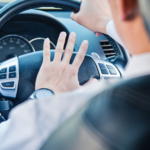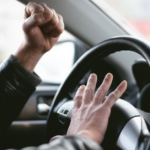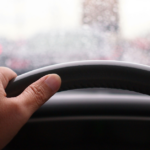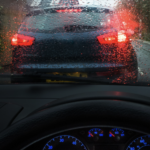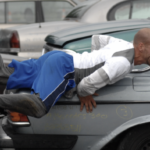Law, Defences and Penalties for Speed Racing, Drag Racing and Burnouts in NSW
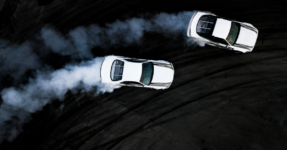
The adrenalin that comes with having a drag race or doing a burnout may be appealing to some, especially younger drivers who revel in the thrill of driving powerful cars.
But it’s important to be aware undertaking these activities on roads or road-related areas can be considered a traffic offence in New South Wales and result in hefty fines as well as loss of licence.
A cautionary case
A 22-year old man has found himself on the wrong side of the law after losing control while doing a burnout in front of a crowd at around 11.40pm on 15 March 2023 at Somerset Drive in Port Stephens and crashing into a power pole before hitting a 20-year old woman and 14-year old girl.
The Ford Falcon caught fire and the young man allegedly left the scene. Paramedics arrived shortly thereafter and the two women were taken to John Hunter Hospital in a serious condition.
The young driver was later arrested and charged with a range of traffic offences including:
- Negligent driving occasioning grievous bodily harm,
- Driving recklessly, furiously or at a speed or in a manner dangerous,
- Failing to stop and assist after an impact causing injury,
- Driving with a suspended licence, and
- Aggravated burnout.
He was granted strict conditional bail and will next appear before Raymond Terrace Local Court on 6 May 2024.
Street Racing, drag racing and burnout offences in New South Wales
Sections 115 and 116 of the Road Transport Act 2013 (NSW) (‘the Act’) contain offences that relate to conduct commonly known as ‘street racing’, ‘drag racing’ and ‘burnouts’.
Organised street racing
Section 115(1) of the Act sets out offences against ‘races, attempts on speed and other speed trials’.
Section 115(1) makes it an offence punishable by a maximum penalty of 30 penalty units for a first offence, or 9 months in prison and/or 30 penalty units for a second or subsequent offence within 5 years, as well as an ‘automatic’ licence disqualification of 12 months on conviction which the court can reduce as it sees fit, to organise, promote or take part in the following conduct without the approval of the Commissioner of Police:
(a) Any race between vehicles on a road, or
(b) Any attempt to break any vehicle speed record on a road, or
(c) Any trial of the speed of a vehicle on a road, or
(d) Any competitive trial designed to test the skill of any vehicle driver or the reliability or mechanical condition of any vehicle on a road.
Immediate licence suspension
Police can also confiscate a driver licence and issue a licence suspension within 48 hours of the charge being brought, a decision which can be appeal to the Local Court.
Confiscation and forfeiture of vehicle and number plates
Police can also confiscate the vehicle that was being used to commit the offence as well as its number plates, or given notice requiring the owner to deliver the items a specified location within 10 days.
The vehicle can be impounded and the plates confiscated for up to three months.
The vehicle may be forfeited to and sold by the state, or transferred to Transport NSW for crash testing in the event of a second or subsequent offence.
What is a motor vehicle?
A ‘motor vehicle’ is defined as any vehicle that is built to be propelled by a motor that forms part of the vehicle.
The definition of ‘vehicle’ encompasses:
(a) any description of vehicle on wheels (including a light rail vehicle) but not including any other vehicle used on a railway or tramway, or
(b) any description of tracked vehicle (such as a bulldozer), or any description of vehicle that moves on revolving runners inside endless tracks, that is not used exclusively on a railway or tramway, or
(c) any other description of vehicle prescribed by the statutory rules.
What is a road?
The definition of ‘road’ is an area that is open to or used by the public and is developed for, or has as one of its main uses, the driving or riding of motor vehicles.
The definition includes a ‘road related area’ which is defined as:
(a) an area that divides a road,
(b) a footpath or nature strip adjacent to a road,
(c) an area that is open to the public and is designated for use by cyclists or animals,
(d) an area that is not a road and that is open to or used by the public for driving, riding or parking vehicles,
(e) a shoulder of a road, and
(f) any other area that is open to or used by the public and that has been declared under section 18 to be an area to which specified provisions of this Act or the statutory rules apply.
One New South Wales penalty unit is equivalent to $110 at the time of writing.
Section 115 (3) of the Act makes it an offence punishable by a maximum penalty of 20 penalty units and a 12 month licence disqualification, which can be reduced as the court sees fit, for a person to take part in, organise or promote a race, attempt or trial of a type described in subsection (1) in contravention of an approval granted by the Commissioner of Police.
Again, police are empowered to confiscate a licence and issue a licence suspension within 48 hours of the charge being brought, which can only be revoked by a court, and the court can reduce the automatic disqualification period as it sees fit if a driver is convicted of the offence.
Defences to the charges
Legal defences to organised street racing charges include duress, necessity and self-defence.
In the event evidence is raised of any such defence, the onus shifts to the prosecution to prove beyond a reasonable doubt that the defence does not apply to the circumstances of the case.
A person is entitled to an acquittal (ie a not guilty verdict) if the prosecution is unable to do this.
The offences also do not apply to any test relating to the slow running of a vehicle.
Drag racing and burnouts
Section 116 of the Act contains offences that relate to drag racing and burnouts.
Section 116(1) contains the offence commonly known as conducting a burnout.
The section prescribes a maximum penalty of 10 penalty units is where a person operates a motor vehicle on a road in such a manner that it causes the vehicle to undergo sustained loss of traction by one or more of the wheels.
Section 116(2) contains the offence normally referred to as ‘aggravated burnout’.
It imposes a maximum penalty of 30 penalty units for a first offence, or 9 months in prison and/or 30 penalty units for a second or subsequent offence within 5 years, as well as an ‘automatic’ licence disqualification of 12 months on conviction can be reduced by a court as it sees fit, to:
(a) operate a motor vehicle contrary to subsection (1) knowing that any petrol, oil, diesel fuel or other inflammable liquid has been placed on the surface of the road beneath one or more tyres of the vehicle, or
(b) do, or omit to do, any other thing that prolongs, sustains, intensifies or increases loss of traction as referred to in subsection (1), or
(c) repeatedly operate a motor vehicle contrary to subsection (1), or
(d) operate a motor vehicle contrary to subsection (1) at a time, or on a road in a place, knowing that there is an appreciable risk that operation of the vehicle in that manner at that time and place is likely to interfere with the amenity of the locality or the peaceful enjoyment of any person in the locality or make the place unsafe for any person in the locality, or
(e) willingly participate in any group activity involving the operation of one or more vehicles contrary to subsection (1), or
(f) organise, promote or urge any person to participate in, or view, any group activity involving the operation of one or more vehicles contrary to subsection (1), or
(g) photograph or film a motor vehicle being operated contrary to subsection (1) for the purpose of organising or promoting the participation of persons in any such group activity.
Immediate licence suspension
In the case of aggravated burnout charges brought under section 116(2), police can also confiscate a driver licence and issue a licence suspension within 48 hours of the aggravated burnbeing brought, a decision which can be appeal to the Local Court.
Confiscation and forfeiture of vehicle and number plates
In the case of aggravated burnout charges brought under section 116(2), police can also confiscate the vehicle that was being used to commit the offence as well as its number plates, or given notice requiring the owner to deliver the items a specified location within 10 days.
The vehicle can be impounded and the plates confiscated for up to three months.
The vehicle may be forfeited to and sold by the state, or transferred to Transport NSW for crash testing in the event of a second or subsequent offence.
Defences to the charges
A person is not guilty of a drag racing or burnout offence if the person establishes ‘on the balance of probabilities’ (ie it was more likely than not) that your actions were not deliberate.
A person is also not guilty if the actions were undertaken in accordance with an approval from the Commissioner of Police.
Additional legal defences include duress, necessity and self-defence.
Avoiding a criminal record for speed racing, drag racing and burnout offences
Needless to say, a person’s charges will be dismissed and any resulting consequences revoked in the event he or she pleads not guilty and the prosecution is unable to prove the offence/s beyond a reasonable doubt.
It is also important to be aware that a person pleads who pleads guilty or is found guilty can also avoid a criminal conviction as well as the resulting consequences – such as a licence disqualification, fine and/or forfeiture of vehicle / plates – if the court is persuaded to make a ‘non-conviction order’ such as a section 10(1)(a) dismissal or conditional release order without conviction.
The prospects of obtaining a non-conviction order are maximised by undertaking a number of steps in the lead-up to the sentencing proceedings (ie the day on which the court receives materials, hears from the defence and prosecution and decides the appropriate penalty) such as obtaining character references, preparing a letter of apology, undertaking any relevant programs such as a traffic offender program, and by engaging experienced lawyers who specialise in traffic offences and have a long and proven track record of persuading magistrates and judges to deliver lenient outcomes.
Charged with a speed racing, drag racing or burnout offence?
If you are going to court over a speed or drag racing, or burnout, offence, call Sydney Criminal Lawyers on (02) 9261 8881 for a free first conference during which our expert traffic lawyers will assess your case, advise you of the law, your options and the best way forward, and fight for the optimal outcome.



